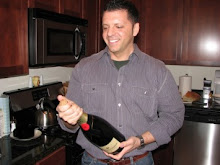Since I originally wrote this piece, Dr. Vino (aka Tyler Coleman) referenced a column written by Jonah Lehrer (a contributor for Wired magazine). The topic of this column referred to a tasting of 2007 Bordeaux wines by the renowned Robert Parker. For those who are not aware of who Robert Parker is, let me explain. Simply put, he is the most influential wine critic in the world.
Lehrer quoted Dr. Vino in his piece, stating:
A final issue is about points and the nature of blind tasting, a capricious undertaking is there ever was one. Although Parker did not rate the wines yesterday, his top wine of the evening (Le Gay) was the lowest rated in the line-up from his most recent published reviews... For all the precision that a point score implies, it is not dynamic, changing with the wines as they change in the bottle, nor does it capture performance from one tasting to the next.
This posed a serious issue that I addressed when i first started writing A Wine Odyssey. In that piece, I said it is exceptionally important to know yourself and what you like. It also addressed some of the issues that presented themselves when assessing a rating.
The following is from an earlier post entitled What exactly do wine ratings mean? From back in July:
First off, there is the analysis of the wine. When the taster is assigning a rating, it is based off the quality of the appearance, aromas, taste, balance and complexity, among a few other considerations.
Second, each of these ratings and descriptions are based off of the tastings of typically one person who happens to be covering the wine region that the bottle you are considering falls under. These tasters work for any of a number of wine publications (i.e. - Wine Spectator, Wine Advocate, etc.). These wine experts who report are by no means amateurs. In fact, they have some of the most discerning palates in the world. They can tell the difference between mediocre and good, as well as outstanding and truly great. However, in the end, everyone is going to have their own unique experience with wine.
Third, it is widely assumed that there is a certain amount of politics involved. I am not saying that tasters are going to overlook obvious flaws, but there are sometimes some suspect ratings issued. Just remember, the wine community is a tight group that you do not want to find yourself on the outside of, especially if you are a publication that relies on their access.
Finally, if the tasting is not done blindly,which means without seeing the bottles and labels from which the wine is poured, this may have a significant impact. If a professional taster views the label prior to tasting, they will know the winery, the vineyard it came from, the reputation, and the price range. These bits of information may lead to bias either for or against a certain producer/vineyard.
These points are illustrated very clearly in the above example of Robert Parker's blind tasting of the 2007 Bordeaux vs. his published ratings which were not done blindly.
So, what should you take away from all this nonsense? I feel the most important thing you can do is be yourself. It is important to have wine ratings to help navigate through the vast world of wines. I would not, however, take these ratings as word of God. Know your palate, know what you like and build off of that. If you are trying to decide is a certain bottle is going to be as good as advertised, I would recommend you use Cork'd or Cellar Tracker. Both of which offer a collection of ratings and tasting notes from people who have actually tried these wines. The scores are then pooled to give, in my opinion, a far more accurate rating.
100 Point Scale & Meanings:
100-95: A classic, truly great wine
94-90: An outstanding wine that is superior in character and style
89-85: A very good wine with a few special qualities
84-80: A good wine
79-75: A very mediocre, but drinkable wine that may possess a few flaws
74-50: A wine that is not recommended for consumption




